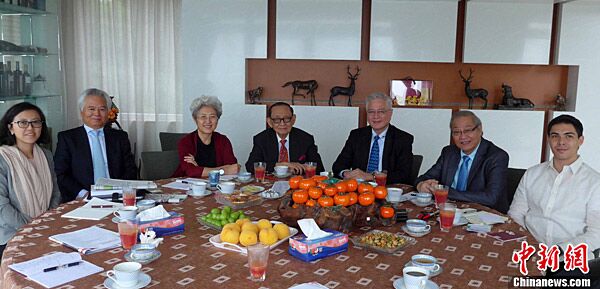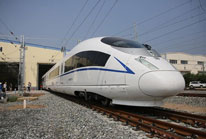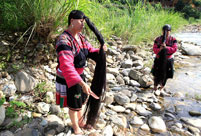

 |
Former Philippine President Fidel Ramos kicked off his five-day visit to Hong Kong on Aug. 8. He was sent to Hong Kong as special envoy of current Philippine President Rodrigo Duterte.
Though Ramos said very clearly that his job during this visit is not to negotiate, his trip comes at a very sensitive moment; many people are speculating over whether this trip will renew China-Philippines ties.
Mutual trust between China and the Philippines has weakened since the latter unilaterally filed for arbitration over the South China Sea issue. But since Duterte took office at the end of June, he has said on several occasions that he hopes to resume talks and forge improved bilateral relations.
As president of the Philippines from 1992 to 1998 and the former chairman of the Boao Forum for Asia, 88-year-old Ramos still maintains frequent contact with China. Throughout his terms, he always managed to control frictions with China over the South China Sea.
China welcomes the special envoy to restart talks, stating that it has never shut the door on negotiations with the Philippines. Ramos may also gain a better understanding of China's position through this unofficial visit. As a sort of preliminary “ice-breaker” for both countries, many hope the visit will create better conditions for diplomatic negotiations in the future.
China's position on the South China Sea issue will never change. It will never accept any propositions or actions based on the arbitration results. However, the fact remains that the two countries reached a consensus on the South China Sea issue before the one-sided arbitration began. Now it is time for both countries to return to that consensus and solve any further disputes through negotiation and consultation. Bilateral talks between China and the Philippines are only a matter of time, but sooner is better than later.
In addition, the two countries must disregard external interference. During the process of the South China Sea arbitration, certain countries with no direct relationship to the issue nevertheless inserted themselves and disrupted stability in the region. These countries meddled because they did not want China and the Philippines to solve the issue through negotiations.
After the results of the arbitration were announced, most countries in the region exercised restraint, while unrelated countries continued pointing fingers and creating additional tension. These two approaches present a sharp contrast.
China and the Philippines should learn from the Middle East. Western countries incited the military-dominated Arab Spring, which only served to leave some Middle Eastern nations exposed to threats of separatism and terrorism.
Similarly, the countries in the South China Sea should be alert to plots from “outsider” countries who are capable of disrupting regional stability with abstract logic. The biggest victims will be the countries in the region, while the troublemakers will undoubtedly walk away scot-free.
In short, China remains open to warmer contact with the Philippines, and welcomes Ramos to visit China as a special envoy. It is willing to take this opportunity to manage disputes in a constructive manner and actively create conditions that foster bilateral relations.
China and the Philippines will always be neighbors. As such, both countries should make an effort to meet each other halfway. The two countries should join hands to safeguard regional stability and share the dividends of peaceful development.
(The author is a commentator for People's Daily and executive vice president of the China Institute of International Studies.)
 World's fastest bullet train to start operating next month
World's fastest bullet train to start operating next month Huangluo: China's 'long hair village'
Huangluo: China's 'long hair village' Spectacular bridge with one of the tallest piers in the world
Spectacular bridge with one of the tallest piers in the world Magnificent view of Hukou Waterfall
Magnificent view of Hukou Waterfall A glimpse of Stride 2016 Zhurihe B military drill
A glimpse of Stride 2016 Zhurihe B military drill US Navy chief tours Liaoning aircraft carrier
US Navy chief tours Liaoning aircraft carrier Chinese American woman wins Miss Michigan
Chinese American woman wins Miss Michigan Centenarian couple takes first wedding photos
Centenarian couple takes first wedding photos Traditional Tibetan costumes presented during fashion show
Traditional Tibetan costumes presented during fashion show Top 10 livable Chinese cities
Top 10 livable Chinese cities Top 20 hottest women in the world in 2014
Top 20 hottest women in the world in 2014 Top 10 hardest languages to learn
Top 10 hardest languages to learn China’s Top 10 Unique Bridges, Highways and Roads
China’s Top 10 Unique Bridges, Highways and Roads China, Russia should join to foil THAAD
China, Russia should join to foil THAAD Party warns of attempts to foment revolution after rights lawyer trial
Party warns of attempts to foment revolution after rights lawyer trial Biting the bait to see what the soothsayers outside Buddhist temples actually do
Biting the bait to see what the soothsayers outside Buddhist temples actually do Chinese death taboo makes it hard to develop care homes despite aging society
Chinese death taboo makes it hard to develop care homes despite aging societyDay|Week